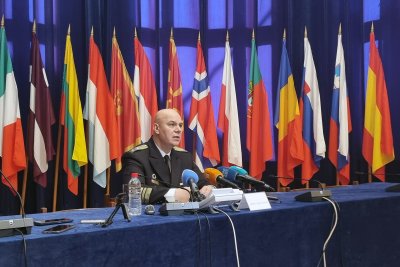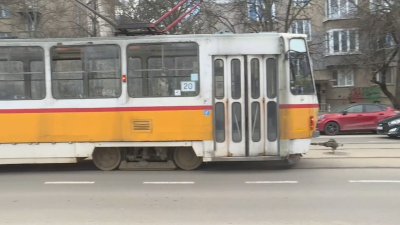In 2023, the Bulgarian Orthodox church celebrates Easter on 16th of April.

Bulgarian Patriarch Neofit headed the festive Easter liturgy in “St. Alexander Nevsky” Cathedral in Sofia.
At midnight, His Holiness greeted the faithful in the square in front of the cathedral three times with "Christ is Risen".
The Secretary General of the Holy Synod, Bishop Gerasim, read the Patriarchal and Synodal Easter message to the Bulgarian people, saying that Christ's Resurrection is the foundation of the faith of the Orthodox Christianity.

President Rumen Radev and caretaker Prime Minister Galab Donev attended the service at "St. Alexander Nevsky" Cathedral.

Images by BGNES
***
Easter or Velik Den (Great Day) is one of the most important holidays in Bulgaria. The holiday starts with Palm Sunday and the holy week leads up to the Easter Day. The Easter weekend is only the end of the Orthodox ritual connected with Christ’s resurrection. The beginning of the ritual is a seven week long fast called “The Great Lent”.
In Bulgarian Orthodox Church tradition, the Lenten fast begins on Zagovezni, ('The Great Lent'). This comes around each year falling on a Sunday, seven weeks before Easter. This is the longest fasting period of the year in Orthodox tradition, 46 days. This means abstaining from meat and dairy products. No traditional dancing and no marriages take place until Easter.
The last week of the fast, the week right before Easter is called “The Holy Week”, during which people go to different church services, fast and prepare for the feast.
Brightly coloured eggs and Easter breads known as “kozunak” are the prominent symbols of Easter in Bulgaria.
As part of the tradition, people dye hard-boiled chicken eggs, the first of which is painted red to represent the blood of Christ. The hard shell of the egg symbolizes the sealed Tomb of Christ — the cracking of which symbolizes his resurrection from the dead.
Traditionally, eggs were decorated by using natural colours. Some people still use old techniques of dying by cooking eggs in water with onions, walnuts, roots and different herbs. Over the years, with the changing trend, people have started embellishing their Easter eggs with synthetic colours and dyes.
After painting the eggs they are usually rubbed with oil to make them shine.
The traditional braided sweet bread, kozunak, symbolizing the body of Christ, is a necessary item of the Easter table everywhere.

Image by BGNES
Many people attend the church service, where at midnight, between Holy Saturday and Easter Sunday, the priest announces ‘Christ is Risen!’ They walk around the church three times and then carry their lit candles home with them to ensure luck and prosperity in the coming year. People usually take Easter eggs and breads to be blessed by the priests in the church.
The egg cracking is a tradition in Bulgaria. It starts from the first minutes of the Easter Sunday. People take turns cracking their decorated eggs against the eggs of others. The holder of the last unbroken egg is said to be the winner and is believed to have great luck, health and fortune for the next year.
Easter Sunday itself is celebrated with a large family meal, rich in tastes and typically including roasted lamb with rice and herbs stuffing, spring green salad and sweet Easter breads.










 Чуй новините
Чуй новините Подкаст
Подкаст























